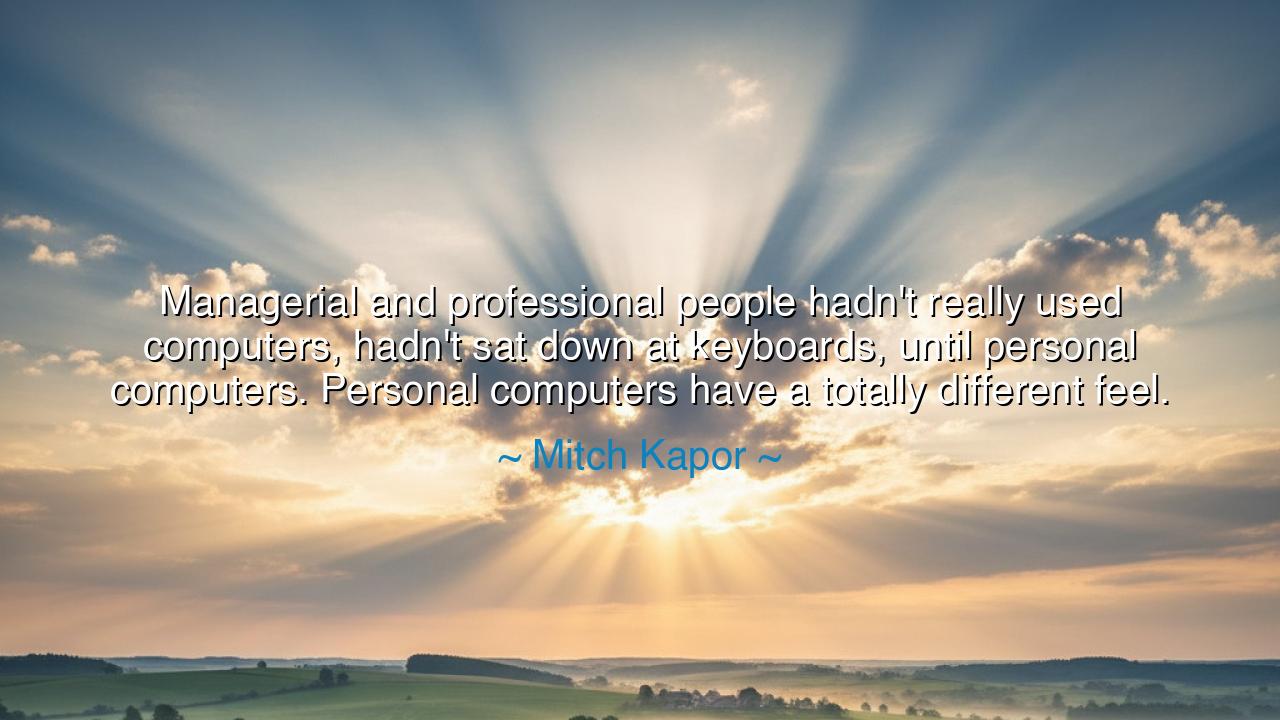
Managerial and professional people hadn't really used computers
Managerial and professional people hadn't really used computers, hadn't sat down at keyboards, until personal computers. Personal computers have a totally different feel.






Hear, O children of the earth, for the words of Mitch Kapor speak to a profound shift in the fabric of our existence: "Managerial and professional people hadn't really used computers, hadn't sat down at keyboards, until personal computers. Personal computers have a totally different feel." These words are not just a statement about technology, but a reflection on the way in which tools shape human interaction, the way in which innovation alters our very relationship with the world, and how the introduction of personal computers fundamentally transformed the way we work, think, and connect with one another.
In ancient times, the tools of the trade were simple, yet powerful. The scribe, who carefully etched words onto stone or parchment, wielded his quill with skill and purpose. The artisan, whose hands shaped wood, clay, or metal, knew the weight of his craft. These tools were not just instruments; they were extensions of the individual, each one contributing to the creation of something that could outlast a lifetime. But the arrival of the personal computer marked a radical departure—a shift that was as profound as the transition from the spoken word to the written word. The feel of the tool, the connection between human and instrument, had forever changed.
Before personal computers, those in the managerial and professional realms were somewhat disconnected from the tools they used. They relied on typewriters, pens, and paper, tools that required significant effort and were more removed from the process of creation. There was a clear barrier between the human mind and the work being done—physical effort was required, and the tools were not as immediate or as responsive. Kapor’s insight speaks to this shift: the personal computer was not just a machine, but a companion, a partner in the creative process that transformed the way people interacted with information.
Think of the story of the great thinkers of the Renaissance, who used tools like quills and ink to share their ideas with the world. Leonardo da Vinci, whose ideas spanned art, science, and engineering, relied on handwritten notes to capture his thoughts, to express his genius. But imagine had he lived in an era where the personal computer existed. His process would have been radically different—quicker, more immediate, and perhaps more connected to the world around him. The personal computer, Kapor says, has a different feel, one that allows for immediacy, for a real-time connection between the mind and the work, a connection that was impossible in the days of quills and scrolls.
This shift to the personal computer is not just about the tool itself; it is about the relationship between the human mind and the work being done. The keyboard, the mouse, and the screen are not just external instruments; they are extensions of the self. Through these devices, the human being is able to directly interact with vast realms of information, to manipulate and shape that information with ease. The feel of this new tool is intuitive, and it opens new doors to creativity, efficiency, and collaboration that were once thought impossible. It is a partnership, not between man and mere tool, but between mind and machine—a harmonious relationship that allows for new forms of creation.
The lesson here, O children of the earth, is one of adaptability and awareness. Just as the tools of the ancient world shaped the lives of those who wielded them, so too do the tools of today shape our world. Kapor’s words remind us that we are not simply users of technology; we are in a constant relationship with it, and in this relationship, we must learn to be mindful of how it shapes us. The personal computer allows for great freedom and efficiency, but it also demands that we stay connected to our own humanity, that we recognize the potential for these tools to be both empowering and distracting.
In your own lives, O seekers of wisdom, embrace the tools you have at your disposal, but remember that they are not the end—they are the means to an end. The personal computer has a different feel, one that offers both opportunities and challenges. Understand your relationship with these tools. Use them wisely, with purpose and intention, for they have the power to enhance your creativity and connect you with the world, but they can also distract and isolate. As you journey through this age of technology, let your connection to the machine serve your highest purpose, and never forget that you are the one who guides the hand that types, clicks, and creates.
In this world, where the tools are at our fingertips, it is up to us to shape their use with intention and wisdom. The personal computer, like all tools, is but an extension of our minds—and how we use it, how we feel it and interact with it, will determine the course of our creativity, our productivity, and our connections. Use it with purpose, for the journey of creation is one that requires both mind and machine working together.






AAdministratorAdministrator
Welcome, honored guests. Please leave a comment, we will respond soon